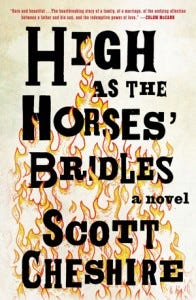interviews
INTERVIEW: Scott Cheshire, author of High as the Horses’ Bridles


Those who know Scott Cheshire know the sort of decency he exudes, a kind inseparable from that of a searcher who has seen the precipice and taken true gauge of its depths. High as the Horses’ Bridles is a torrential debut novel. It’s bold. It’s substantive. It’s formally inventive. From within the whirly circles of the NYC literary scene, it can sometimes appear that writers shun serious treatment of the day’s banner subjects, those scrolled across the country at large, even one as wide and clear and pervasive as evangelical Christianity. Are we daunted? Over the span of centuries, stories have a way, it seems, of slipping into religious texts and leaving their individual authors behind. This past Father’s Day (apropos, it turns out, for High as the Horses’ Bridles), I had the distinct pleasure of chatting by email with Scott. We talked the Book of Revelation, humor, rewriting, and what science and faith might have to say to each other. — J.T. Price
J. T. Price: In the mode of Galifianakis, I’ll start by asking, Why horses? Why a novel about horses?
Scott Cheshire: I have never heard of this Galifianakis. I assume he’s a lesser Greek poet, or something…
JTP: Yeah, renown for a collaborative epic poem called The Hangover…
SC: It’s actually a very good question. I never set out to write a book with “horses” in the title, and while I did write a book in which there are horses, it’s certainly not about horses. It’s about a troubled family, and it’s about religious legacy, a struggle with faith, and the difficult reuniting of a father and son — all of that, and yet the kernel of all that drama is an apocalyptic vision the son, Josiah, has, as a boy. The vision of a horse. Something I’ve not yet really considered, I guess, is why the vision of a horse?
JTP: If you don’t mind… I’ve actually got a page marked, from the later stages of the book. (Breaking the Galifianakis mold…) This is the estranged wife of the protagonist asking the same question: “But why horses? Why not as high as tank treads, if this is supposed to impress me? Or high as a Chevrolet’s side mirrors, and for two thousand years the faithful are wondering, What’s a side mirror? What’s a Chevy?”
SC: I like to think it’s a funny book, and maybe those lines give a sense of that, so thanks for bringing them up. I guess the answer to all this is partly the wonderfully anachronistic image of a warhorse. I mean, if there is a Second Coming it somehow makes sense that it would happen via horse, a great white horse. And yet horses also suggests a woefully ill-prepared return to battle. At least, if you read the image literally, which most believers do. That’s the fascinating and self-defeating essence of prophecy: it’s of its time, so it dates.
As far as giving the book its title, there were a few contenders.
Flannery O’Connor says: “The only way to learn to write short stories is to write them, and then try to discover what you have done.”
I would dare go a bit further, and say it’s not only how I learned to write, but it’s how I will always write. I write, and only discover what’s there afterward. In this case, I discovered horses, among other things. They figured in the book in a sort of mysterious way, even for me. Plus it’s a damn good phrase, and I can say that because it isn’t mine. It comes from Revelation.
JTP: Now, as psychoanalyst or self-realization guru: how greatly did the Book of Revelation shape your own childhood, your expectations of the adult world? How fluent are you with it now? And did you find yourself returning to those pages while writing High As The Horses’ Bridles? How did those successive returns feel?
SC: Revelation looms large for me, always has since childhood. We read and studied it weekly at church, probably more than any other book. And for that I guess it gave me a rather apocalyptic perspective on the world. More than most, I guess, but not nearly as much as some.
Harold Bloom has a good book about American Christianities (of which there are many) called The American Religion, and in it he calls Revelation “the preferred text,” for some sects. He also calls it a “nightmare of a book.” He’s right on both counts, but I also think he sells the book way short. Nightmares come in all forms, and Revelation is one to which we all collectively and perennially return. And I do mean all of us. There’s something disturbingly attractive about the violently apocalyptic endgame scenario.
JTP: Sort of the Reservoir Dogs, video game final level, ‘guess I’ll end the novel in a melee like Bonfire of the Vanities’ phenomenon? The Book of Revelation being a foundational text in that regard…
SC: Absolutely. There is something gloriously and strangely legitimizing about it. Before I started the book, I hadn’t looked at Revelation for years, decades, even. But at some point I realized it was in some ways the book from which this novel comes. And so I had to return to it, reconsider it, and re-familiarize myself with its pages. I found the best way to do that was to immerse myself in the history of the book, remove it from its contemporary cultural trappings — which incidentally have almost nothing at all to do with the genesis of the work.
JTP: You’re reminding me of an excellent essay of yours on the subject…
SC: Well, thanks for saying that. Writing that essay was difficult, mostly because it was the first time I tried to honestly ask myself the question: why am I writing this novel? I had deliberately buried myself in the work of a few modern scholars, studies of American religious history, eschatology, and the ancient apocalyptic form. My shelves are stuffed with them. Writing the essay felt like the first time I’d come up for air. At some point I realized, wait a second, Revelation is basically just a dream. It’s a dream of vengeance and reward, at its core. And I get that. I think we all do.
JTP: Apocalypse fiction is hot (or is it cold?). Some of the contemporary treatments are fantastical or readymade allegories, while others provide much more disturbingly plausible scenarios. In contrast, your novel feels like a kind of patient zero study, one that parses underlying sources of doomsday visions, in both their individual and collective form. The wild world-historical impossibility of the question aside, what is it about visions of apocalypse that won’t leave us — I mean, the human species — alone? Dogs, for example, probably don’t have the same preoccupation. Although I guess I can’t be sure.
SC: This is the big question, isn’t it? Why? I think the answer is pretty simple: it makes sense. That is to say, it makes time itself make sense. It gives existence narrative form. Closure. It’s no accident the Bible ends with Revelation. Any first year MFA student would say, I think, End it here.
JTP: Or there’d be a comment, ‘Um, the tone shifted here a bit and made me feel kicked out of the story…’
SC: Yes! Or something like — I get that He’s out to end the world, and all, but I don’t know what He really wants, you know?
The ancients used to write these stories and deliver them aloud during wartime, including Revelation. It was therapeutic.
And who doesn’t like a little drama? A little blood? Apocalypse is the über-action scene. And I for one love those movies, even the bad ones. They get my cash every time.
In my book, apocalypse works just this way for Josiah’s father, who desperately wants it all to make sense, especially after losing his wife. And when she passes, that apocalyptic longing is entirely domesticated. He tries to bring it on himself, within his very own home. It should also be said that, in the classic sense, the End is essentially just the Beginning. Even Revelation ends on a note of hope. The Future will be Better. Next time! And this can be comforting when you lose a loved one. As far as Josie, well, I think he’s trying to dismantle the apocalyptic mindset. And it’s hard. As far as dogs: my pug, Olive, I pray fears nothing at all.
JTP: Josiah Laudermilk, aka Josie, your protagonist: where did you find him? A Queens-raised childhood biblical prodigy turned successful young California beach-town entrepreneur. When we make his grown acquaintance, he is flagging on multiple fronts: romantic, familial, and, prior success aside, professional…
SC: Well, it might seem exotic to some that I was a kid preacher, but in that community everyone was expected at some point to preach and deliver sermons, especially the boys. So it seemed natural to me to use that history, and it weirdly made sense for the reader. I wanted the opening scene to feel grand and new, and less and less alien for the reader. A young boy on the occasion of his first large-scale sermon would experience the scene in just that way, hence young Josiah.
JTP: It’s interesting, that scene, I felt almost like we were inside the mind of the adult Josiah as he attempts to reconstruct this incredibly powerful experience from his childhood in minute detail. The sense of time passing slows down…
SC: Oh man, I love you saying that, because that is exactly how I imagined it. In fact, as far as I’m concerned that whole first section is a first-person narrative. “First-person removed,” we’ll call it. I think I just invented a newish perspective. That whole section is a movement from third to first, from “them” to “me.” It embraces the other. He’s claiming his personal history.
On the other hand, making the leap to adult Josiah was difficult, for lots of reasons. One being: how do you make something not happening (the end of the world) dramatically interesting? And can it sustain a whole book? And so I started thinking about the thousands of people whom every time are disappointed by yet another failed religious End Times prophecy — which happened recently, in 2011, with Harold Camping and his followers. That whole non-shebang definitely played a part in why I wrote the essay you brought up earlier. Of course, for lots of believers it’s simply a matter of reworking the numbers, and deciding on a “more precise” date. But for others it means the end to their faith, and what a terrible and conflicted sense of disappointment that must be. To me, that was an interesting problem. How do you un-know what you thought you knew? Josie (no longer Josiah) attempts to un-know, and he grapples with and reads the physical world as he becomes newly accustomed to it. He made me see the daily world around me in brand new ways. It was a thrilling perspective to write from, and not entirely unfamiliar.
JTP: The story unlocks in the manner of a nesting doll: one enormously pivotal scene opening to reveal successive stages in the lives of Josie and his family and friends. Over the novel’s course, time seems somehow to both advance and retreat while the narrative layering deepens. I wonder if you could talk a little bit about the structure?
SC: The structure of the book was absolutely its most difficult aspect. I wanted to figure out a way of denying the book a linear narrative because I felt that otherwise it would be too sympathetic to the apocalyptic model of time. Beginning. Middle. End.
The middle section, called “The Ends,” at some point started taking on a circular shape, constantly doubling back on itself, which if I’m honest is closer to how I experience the world, anyway.
The past and the immediate past are always alive in the present, and I’m ever trying to reconcile the two. Josie experiences the world in just that way, constantly circumnavigating what it means to be alive at any given moment. It also became a way of creating dramatic tension, casting Josie in the “now,” with few cues to the reader of how he got there. The last thing I wrote was the closing section of the book and yet it might be called the beginning proper of the novel. We go back in time and place. Which ultimately felt right, making the whole book something of a circle.
JTP: For all the gloom and foreboding suggested by your big subject, there is no shortage of humor or emotionally articulate exchanges to accompany the darker atmospherics. Even the most desolate of occurrences (and, yea, desolation there is) seems informed by almost its opposite. Does this sort of sensibility approach a world-view?
SC: It is, for me anyway, and for the longest time the book did not reflect that. It was much darker, or at least as dark with very little comic relief. And then at some point I gave the manuscript to my friend Alex Gilvarry, who is not only a fantastic novelist, but also one of the funniest writers and people I know. He read it and said, “You know in real life you make me laugh, you’re funny. But this is not funny. At all. You should make it more like you.” That changed the book tremendously, and I might even say changed me as a writer. I let Josie be both morbid and funny. A good mix, I think. I mean life is funny — and sometimes it’s ugly, sad, tragic, and painful, but also funny. Maybe it’s my way of dealing with the world. William James says a fundamental difference between the religious and the non-religious is their respective relationship to the universe. The religious agree with it. The non-religious agree to it.
JTP: At one with the flow versus making an idiosyncratic path despite it? Or is that too simplistic?
SC: Not at all. The lazier critical take on the apocalyptic perspective is “they’re just doing what they’re told.” But it’s a perspective on the world that takes a lot of deliberate mental work. As far as I’m concerned, I’m of the latter persuasion. I agree to it all, yes, but reluctantly, and not without laughing.
JTP: I’ve read a fair amount of fiction and watched with dispassion as the epiphany, James Joyce-model, goes in and out of style. If I may say so, you have achieved some higher-level proficiency with the dramatic epiphany. Josie, it seems like, is capable of experiencing epiphanies within epiphanies. What I mean to say is you dramatize the need to believe with remarkable acuity. How about that?
SC: I like it! And I assume you know that super essay by Charles Baxter, “Against Epiphanies,” in which he says if life were truly like most American “literary” fiction then it must be the case that people all over the country are struck with epiphanies all day long and everywhere.
JTP: Yes, great observation from a great essay.
SC: This is palpably not the case.
How many epiphanies have I had in my life thus far? Any? Maybe one.
And even that one came on more like slow-heating water just about to boil a frog. All of a sudden, it hit me — so I jumped before the situation killed me. The formal literary epiphany, The Wonder Years-like sudden realization occurring on a regular basis does not resemble any conscious reality I know of. And yet there is something to the consciousness of a person who tries to be alive to every moment as he can. This inevitably fails, sure, but it’s still a viable, if unsustainable, tack. This is Josie’s mission, and it’s a classically apocalyptic one, which, lest we forget, comes from the Greek for revelation, “a removing of the veil.” Which sounds a hell of a lot like epiphany. The difference being Josie’s attempt is deliberate. The classic and not always believable literary epiphany is accidental. It suddenly just happens. It’s pretty passive. Josie, on the other hand, is actively looking for ways to make the physical world around him deliver a new experience, to learn from it. This is how he hopes to redeem himself, I think, in the eyes of his business partner, his ex-wife, and his father.
JTP: A semi-obscure writer once wrote, “A novel might be the brilliant lived sermon that found no root in organized religion as currently composited.” Is there anything to this theory, do you think?
SC: I believe the writer is Price — J. Now him, I’ve heard of. And I’ve actually read the article, more than once. Why? Because a question I’ve been taken with for many years is at the heart of that lovely phrase. You often hear people, usually non-religious people, say things like ‘Love is my religion,’ or ‘Music is my religion,’ even ‘Food is my religion.’ And of course I’ve heard writers say ‘Writing is my religion.’
JTP: ‘Baseball is my religion.’ ‘Used bookstores are my religion.’ ‘The internet is my religion.’
SC: And more to the point: why does this get my goat? I think it’s because it seems too easy a way out of having to debate a subject or answer a question directly. It’s a way to avoid thinking about what you actually think.
JTP: You mean in the sense that by switching out the context, whatever is under discussion suddenly melts into air?
SC: Exactly. But I’m also inclined to agree. If, as James says, the religious agree with the universe, well, there is little better way to agree with a universe, or a even a world, than to write a novel. Hell, you’re creating the thing. That is a godly move. Not to mention all the ritual that generally goes with writing. Most of the writers I know are ritualistic, which is not to necessarily say disciplined. I have rules by which I write (when I write, when I don’t), rules for what I do before and after I write. I have totems. These are all religiously inflected inclinations. Perhaps the least religious aspect of writing is the solitude. There is no community, at least not involved in the act of writing anyway. In this way the public reading, especially something like the marathon readings mentioned in that piece, do resemble a religious service. It’s communal. Then again, James famously defines religion as “the feelings, acts, and experiences, of individual men in their solitude, so far as they apprehend themselves to stand in relation to whatever they consider the divine.” Solitude! And if that doesn’t sound like a writer I don’t know what does. You see my problem here.
JTP: There’s definitely a tension. Published in 1941, Virginia Woolf’s final novel Between the Acts explores the overlap between faith, technological progress, and the performing arts in a small town theatrical production, a play meant to reprise the entirety of Britain’s history in the shadow of WWII. As the show on the village green approaches the modern moment, an audience member observes, “It’s odd that science, so they tell me, is making things (so to speak) more spiritual…” This observation also appears key to the thematics of High as the Horses’ Bridles… I should note too, that Woolf complicates things, true to form, by having another attendee remark, “If one spirit animates the whole, what about the aeroplanes?” (Aeroplanes. Why did people ever stop calling them that — and in what spirit?)
SC: I hear you. It’s a very pretty word. And I have not read the book, but I will, so I can sound smarter the next time I’m asked this question. I will say this, though, about the notion and the apparent dichotomy between science and spirit: it’s all about wanting to know, wanting to transcend the known limits of humanity, as such, and really know, you know? I remember reading William Gibson’s Neuromancer and thinking, ‘all of this comes from Revelation.’ Even his physical description of cyberspace I’m convinced was artfully stolen from the Bible. As technophilic as that book is, and yes it’s sort of the extreme example, it uses the very skin it claims to slough off and tells pretty much a story of religious spiritual ascent. Very strange. As far as literal science, well, it’s certainly taken on some new dimensions that present a more supernatural picture, no? Other dimensions. Other universes. Other types of time. Frankly, I think it’s a terrific time to be alive, and the things we learn every day, even a mere glimpse at deep-space photography, or a short article on quantum physics for a layman like me, outstrips and outdoes the very dated notion of God so many cling to. That old God is actually not enough to contain what we know about the universe. Maybe it’s high time we redefine God, or better yet leave the idea indefinable, which seems better suited to the idea of God to begin with.
JTP: Today is Sunday and also Father’s Day, which seems somehow apropos in light of your novel’s principal themes. The fraying and mending of a father-son bond, specifically in regard to religious identification, comprises the crux of the story. Where does June 15th, 2014 find Scott Cheshire?
SC: This is a deeply personal question and I welcome it. Here is where I am: I’m in my living room, answering these lovely and thoughtful questions, happy to have a reader take my work seriously. After all, that’s why it’s there. It’s my opening gambit in what I hope proves to be a good and long conversation. My wife is out for a run. The pug is asleep by the air conditioner. Snoring. And I spoke with my father just a few hours ago. He is reading my book right now and is reading, he tells me, every page twice. Once so he can hear my voice, and, once again, so he can follow the story. I think that’s beautiful, and I thanked him for it.
For a long time I was afraid to send the book to my dad, or my mom for that matter. There was the typical fear of the first novelist.
Will they understand this is not about them? That it comes from me, yes, but it’s not me? But I was mostly afraid because of the subject matter. My parents are deeply and proudly religious, as they should be. And so I feared a book that examined one facet of the American religious life would offend. It did not. It does not. I asked my father if he remembered the story of Jacob wrestling with the angel. I said writing this book was my wrestling with angels, if that makes any sense. He said of course it did. And then he said I’d made them proud.
It’s a good day.









